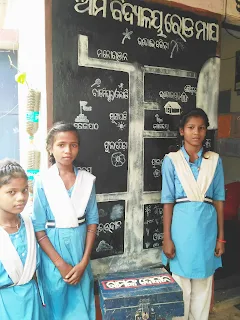Ramanka Dokan: A Beacon of Trust and Responsibility
In the remote village of Khataluguda, 15 kilometers from the
Borigumma headquarter, a small school faced a significant challenge. It was July 15, 2012, the second day at PUPS Khataluguda, when the new headmaster encountered an unusual problem that set the stage for a transformative journey. This story isn't just about overcoming obstacles but about fostering trust, responsibility, and moral values among students.
The Beginning
The school, a single-teacher
institution, had 22 students ranging from class one to class seven. During
lunch break, the headmaster discovered his tiffin box empty, and later, his
money purse with 250 rupees missing. Confronting the students yielded no
confessions,sparking the realization that the children needed a moral compass.
This incident was the catalyst for the creation of an innovative
solution—Ramanka Dokan.
The Concept of Ramanka Dokan
Ramanka Dokan, translated to
"Rama's Shop," was an open box containing various study materials
like pens, pencils, erasers, cutters, notebooks, scales, geometry boxes, and
more, all priced below market rate. Accompanied by a rate chart and a money
box, the shop operated on an honor system. Students could take any material
they needed and either pay immediately or later, without supervision. The
underlying belief was that God Rama would know their truthfulness.
Implementation and Challenges
Every day after the prayer class, the
headmaster shared a moral story with the children, reinforcing values of
honesty and integrity. Initially, there were discrepancies between the
materials sold and the money collected. To address this, the headmaster
decentralized power by handing over the shop's charge to higher class students.
These students were responsible for managing the shop, calculating daily sales,
and reporting any discrepancies.
The turning point came after 2-3 months
when the students began to self-regulate. They not only refrained from stealing
but also reported any excess money found. The system of trust and
responsibility started showing results.
The Impact
The introduction of Ramanka Dokan had
far-reaching effects. It wasn't just about managing a stationary shop but
instilling a sense of ownership, responsibility, and moral integrity in the
students. Over time, the headmaster noticed significant improvements:
Moral Development: The children learned
the importance of honesty and integrity.
- Mathematical Skills: Managing the shop
helped develop their calculation skills.
- Leadership and Responsibility: Taking
charge of the shop fostered leadership qualities and a sense of responsibility.
Recognition and Legacy
By 2019, these efforts culminated in
national recognition. On September 5, the headmaster was the only teacher from
Odisha to receive the National Best Teacher Award from President Shri Ram Nath
Kovind. The innovative approach of Ramanka Dokan was a key factor in this
recognition, along with other activities that reduced the dropout rate to zero
and bridged the gap between home and school.
The success of Ramanka Dokan extended
beyond Khataluguda. Schools in Assam, Rajasthan, and other states adopted this
concept to develop moral values, mathematical competencies, and leadership
qualities among their students. The initiative also received numerous state,
national, and international awards, cementing its impact and legacy.
Conclusion
Ramanka Dokan is more than a story of
overcoming theft; it's a testament to the power of trust and responsibility in
education. By fostering a culture of honesty and accountability, the headmaster
not only transformed his school but also set a precedent for others to follow.
This innovative approach proves that with the right values and practices, every
problem can be turned into an opportunity for growth and development.


.JPG)




Post a Comment